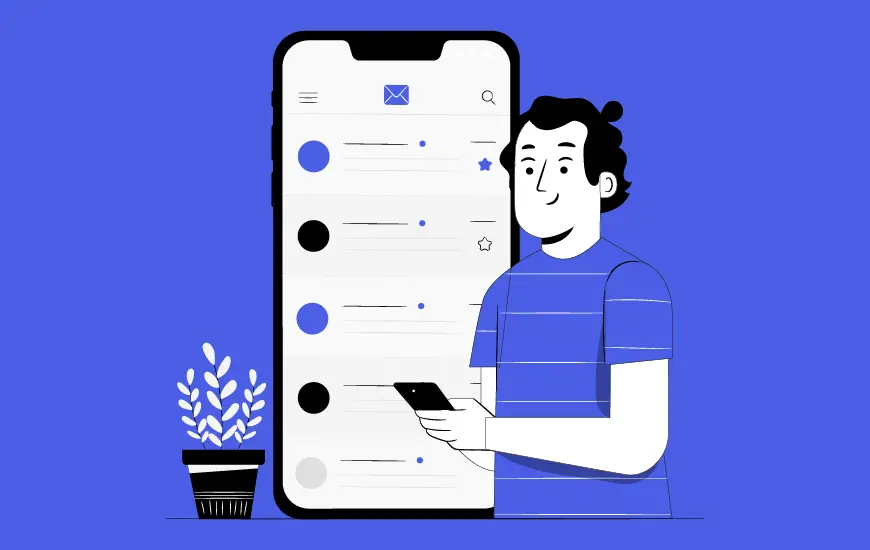- Mobile Apps for Retail Business - What Is All the Hype About?
- Benefits of Mobile Apps in Retail Businesses
- 1. Loyalty Programs
- 2. Data Analytics
- 3. Ease of Using the App
- 4. Personalization
- 5. Retailer-Shopper Relations
- 6. Push-Based Applications
- 7. Sales Assistance
- 8. Brand Exposure
- Must-Have Features for Retail Mobile Apps
- Lucrative Deals and Offers
- Push Notifications
- Categories and Filters
- Digital Wallet
- Multiple Payment Options
- Social Media Sharing
- Multi-Lingual Support
- Real-World Examples of Retail Mobile Apps
- KFC
- 6th Street
- Adidas
- Appinventiv: Your Trusted Retail Mobile App Development Partner
- FAQs
The retail industry took a major hit during and after the pandemic, as businesses were shut down overnight because of global lockdowns. Gradually pulling up, the retail industry is still reeling in the full force of the COVID 19 pandemic and finding innovative ways of reconnecting with customers. Leaders in the industry are actively seeking ways to tackle inefficiencies, identify automation opportunities, and, ultimately, cut costs within their organizations.
While there are several strategies available to enhance business performance, leveraging the potential of mobile apps is the most influential way to add value to retail businesses. Mobile apps for retail businesses have become a key tool for shopping sprees, redefining their overall shopping experience worldwide.
Accordingly, businesses are investing in custom retail mobile app development that caters to the diverse needs of global consumers in various ways. It includes easy product browsing, rewards points, deals & offers, refer & earn, review & feedback, bonus points, and so on.
What is more? With the emergence of the IoT, metaverse and AR/VR technology, users can now try a particular product within their space even before they buy. Be it their favorite little black dress (LBD) or a cozy couch they always dream of sliding in, mobile apps for the retail industry provide personalized experiences to every user, taking their shopping journey to greater heights.
Unsurprisingly, mobile apps for retail businesses have become the easiest and most efficient way to assist consumers with their purchasing decisions and improve conversion rates.
Still unsure? Why mobile apps are important for retail businesses? Let’s delve deeper into understanding the countless benefits of retail mobile app development.
Mobile Apps for Retail Business – What Is All the Hype About?
Mobile apps have taken the world by storm in recent years. Now, smartphones have become an inseparable part of our daily lives, changing the shopping habits of global consumers. As consumers’ habits changed, businesses of all sizes, from emerging startups to huge enterprises, have joined (and are still joining) this digital transformation journey.
Let’s take a closer look at the mobile app statistics and how they are revolutionizing the retail industry.
As per Think with Google statistics,
- 63% of smartphone users are more likely to make purchases from businesses whose mobile apps provide them with pertinent product recommendations they might be interested in.
- Smartphone users utilize half of the installed shopping applications on their smartphones at least once a week.
- According to Forbes Advisor, eCommerce industry sales are anticipated to reach over $8.1 trillion by 2026.
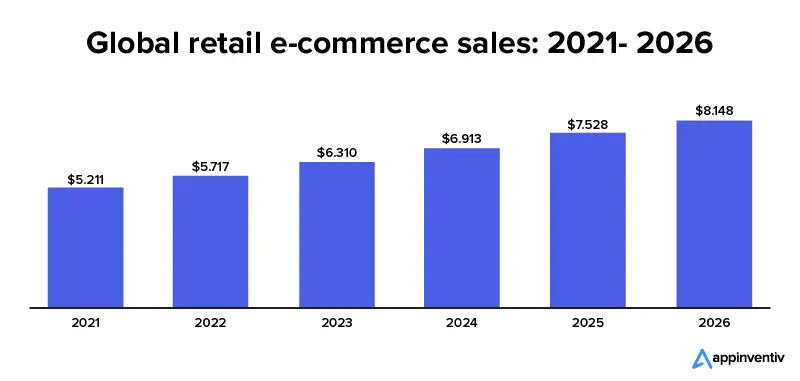
Unsurprisingly, mobile apps for retail businesses are a surefire strategy to survive in today’s cut-throat competitive age. So, if you don’t join this digitalization trend now, you are most likely to be deprived of the opportunities this trillion-dollar industry brings to your business.
Let’s discover in detail why your retail business needs this digital switch.
Benefits of Mobile Apps in Retail Businesses
The thriving mobile platform has brought about revolutionary changes in how retailers connect and converse with customers. No matter what your marketing strategy entails, mobile apps for the retail industry pave the way to communicate with customers and enhance their shopping experience. They also optimize the company’s operations, generate more revenue, and reduce costs. Let’s look at why retailers should opt for retail app development services and how these apps add value to their businesses:
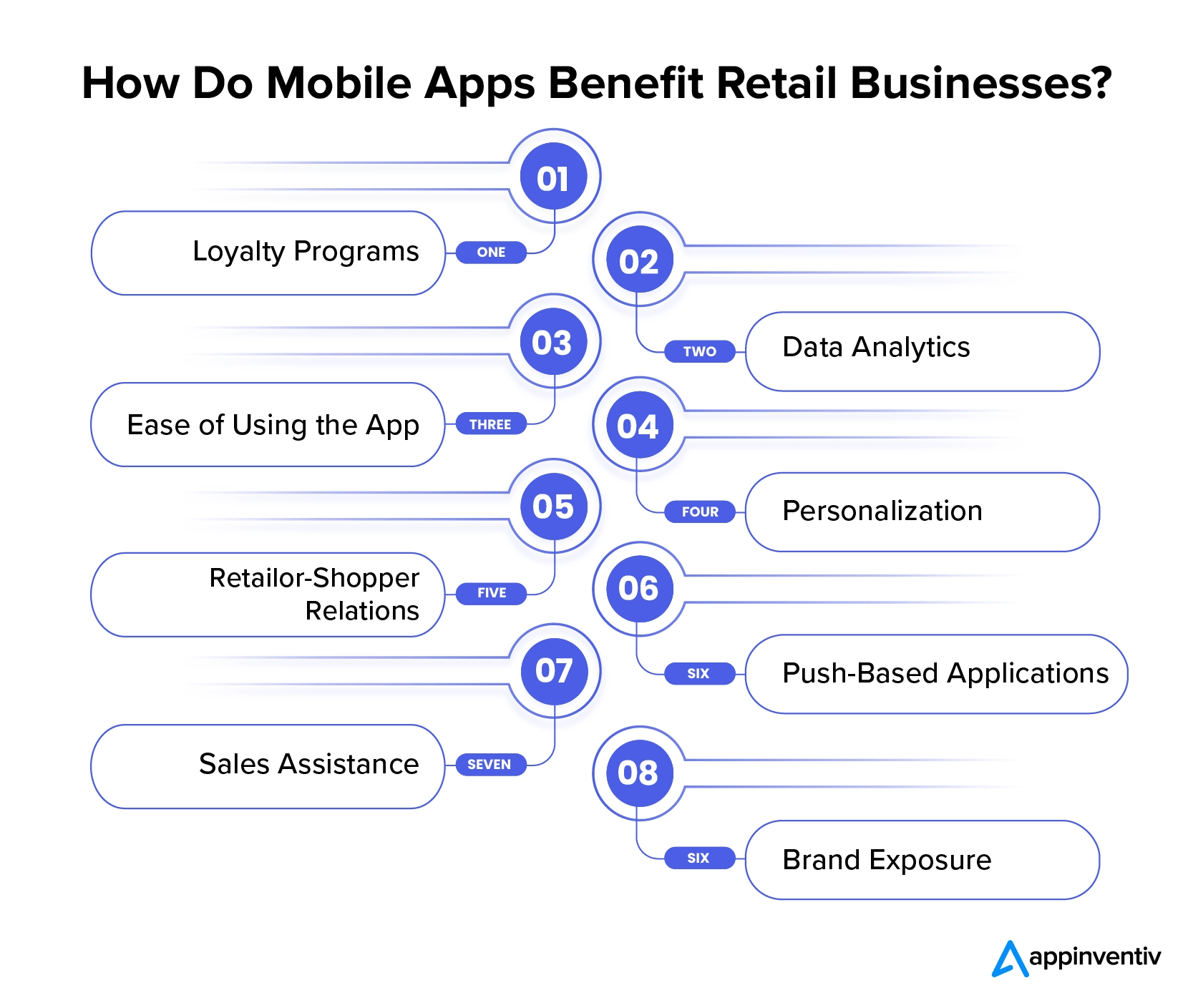
1. Loyalty Programs
Mobile apps provide an excellent platform for running a rewards or loyalty program for retailers. It can control the complete loyalty program and incentivize the users. For instance, existing customers can earn incentives for referring your brand, which will help you increase their engagement and require new users, eventually boosting sales.
2. Data Analytics
In today’s customer-centric world, insights are the new money. Therefore, deep data analytics is necessary to comprehend clients’ less obvious requirements and provide them with a personalized experience. The first step in this process involves collecting information about your customers’ preferences through mobile apps designed for the retail industry. These apps help make informed business choices based on sound analytics. Such a strategy offers a lot of flexibility for enhancing the purchasing experience, increasing revenue for both out-of-store and in-store.
Also Read: How Much Does It Cost to Build an On-Demand Retail Delivery App Like Woolworths
3. Ease of Using the App
Retail mobile apps with an intuitive UI/UX design easily capture users’ attention and enhance their experience. An app’s visually appealing design and exceptional usability can also expedite a brand’s market success and boost ROI. A notable example of outstanding usability is the integration of multiple payment options within the app, simplifying and enhancing the overall shopping experience for customers.

4. Personalization
Mobile apps for retailers provide personalized user experience, thus targeting each individual shopper and enhancing their shopping journey. Today, many companies, like Starbucks and Shoppers Drug Mart, integrate special discounts, push notifications, enticing deals, and customized coupons to meet users’ specific requirements. This personalized approach fosters user loyalty and bolsters engagement rates. As per Think with Google stats, 51% of mobile app users use in-store retail apps to get personalized assistance with their shopping needs.
[Also Read: How much does it cost to build an app like D4D?]
For instance, Edamama, an e-commerce app for mothers, provides tailored product suggestions based on the gender and age of the child. Having easy access to more information helps consumers check reviews, compare products and services, make sound purchasing decisions, and save money with discounts.
Also Read: How Much Does it Cost to Develop an App like Edamama?
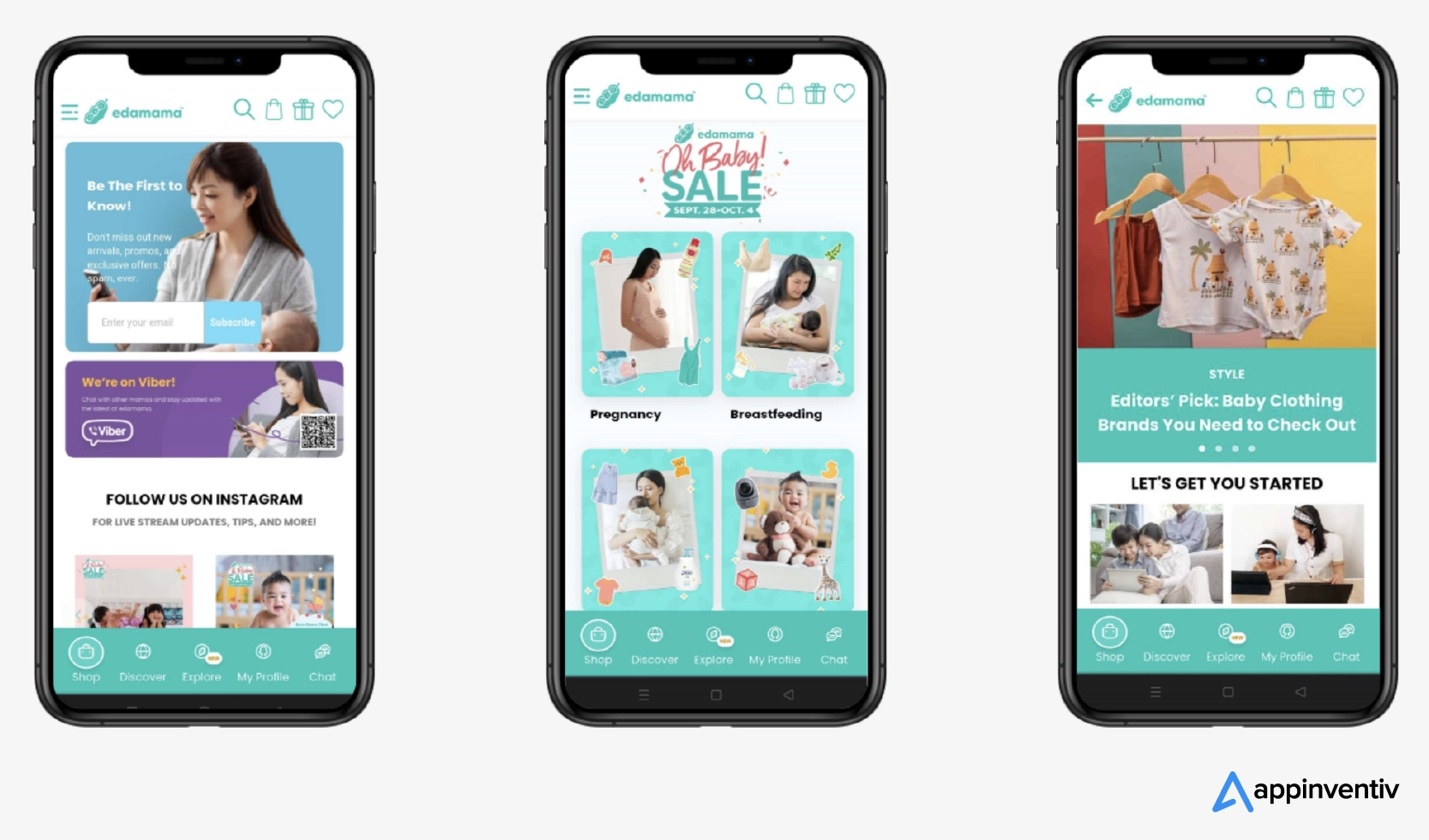
5. Retailer-Shopper Relations
Today’s shopping sprees want something extra convenient that can assist them throughout their buying journey while letting them secure the best possible deals. Retailers understand this well and, as a result, prioritize expanding their online presence with a user-friendly app to facilitate seamless interactions with customers.
The right mobile apps for the retail industry provide shoppers with a broader range of choices and enhanced convenience, effectively meeting their shopping requirements and ensuring a seamless experience. This in-app engagement enhances customer engagement, fosters brand loyalty, and builds a strong customer bond.
For instance, IKEA, the world’s largest furniture retailer, made the customer onboarding experience smoother and witnessed improved engagement with its premium retail mobile app.
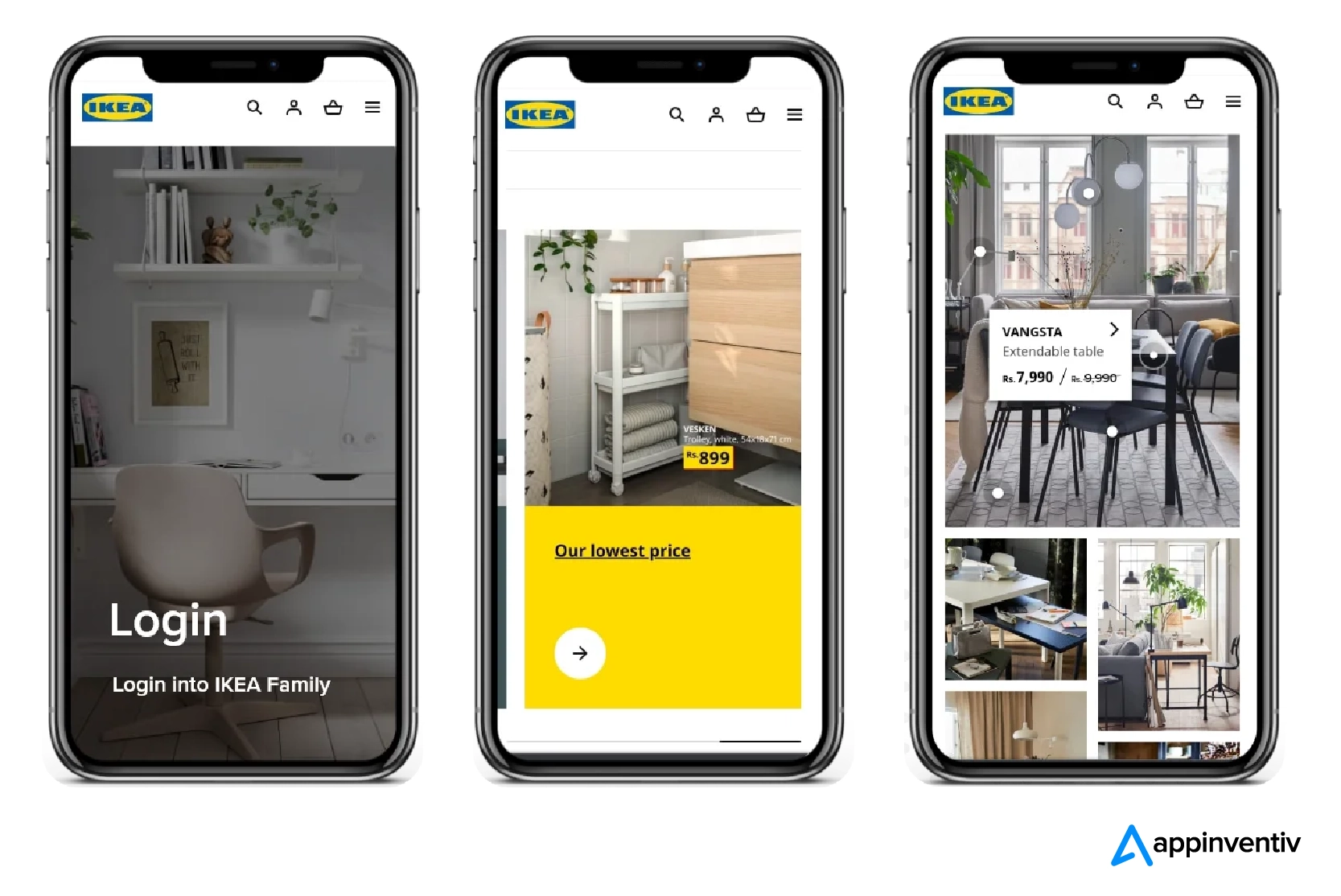
6. Push-Based Applications
Push-based apps can foresee user requirements and deliver pertinent information based on their preferences. Such mobile apps for retailers automatically deliver price, discount, or availability updates to customers who might be interested in a particular product.
7. Sales Assistance
In the retail sector, customer satisfaction and revenue generation come first. Thus, retailers must establish and maintain immediate, real-time connections with customers and promptly address their queries. For this, businesses can harness the power of social media apps.
Mobile apps for retailers empower sales teams by providing them with easy access to real-time data and information. An eCommerce platform can enhance its interactivity by incorporating a chatbot for customer service. These chatbots are designed to respond to common customer inquiries and engage in conversations in a human-like manner, resulting in significant cost and resource savings. These bots come pre-programmed with a set of keywords and activate when a user asks a question to which the program already possesses a stored solution.
You may like to know: The Pros & Cons of Chatbot Development
8. Brand Exposure
One of the most crucial reasons why every retailer needs to go for retail app development solutions is brand exposure and consumer awareness. It can be considered one of the prime benefits of mobile apps for small retail businesses as it provides a platform where regular communication with your target market can grow engagement.
Mobile apps for the retail industry are a powerful digital medium for marketing and business growth, serving as the foremost digital channel to elevate your brand’s presence in today’s tech-savvy era.
Must-Have Features for Retail Mobile Apps
Custom retail mobile app development involves many user-friendly features to benefit shoppers and sellers alike. Listed below are some of the most important retail mobile app features that can add value to your business.
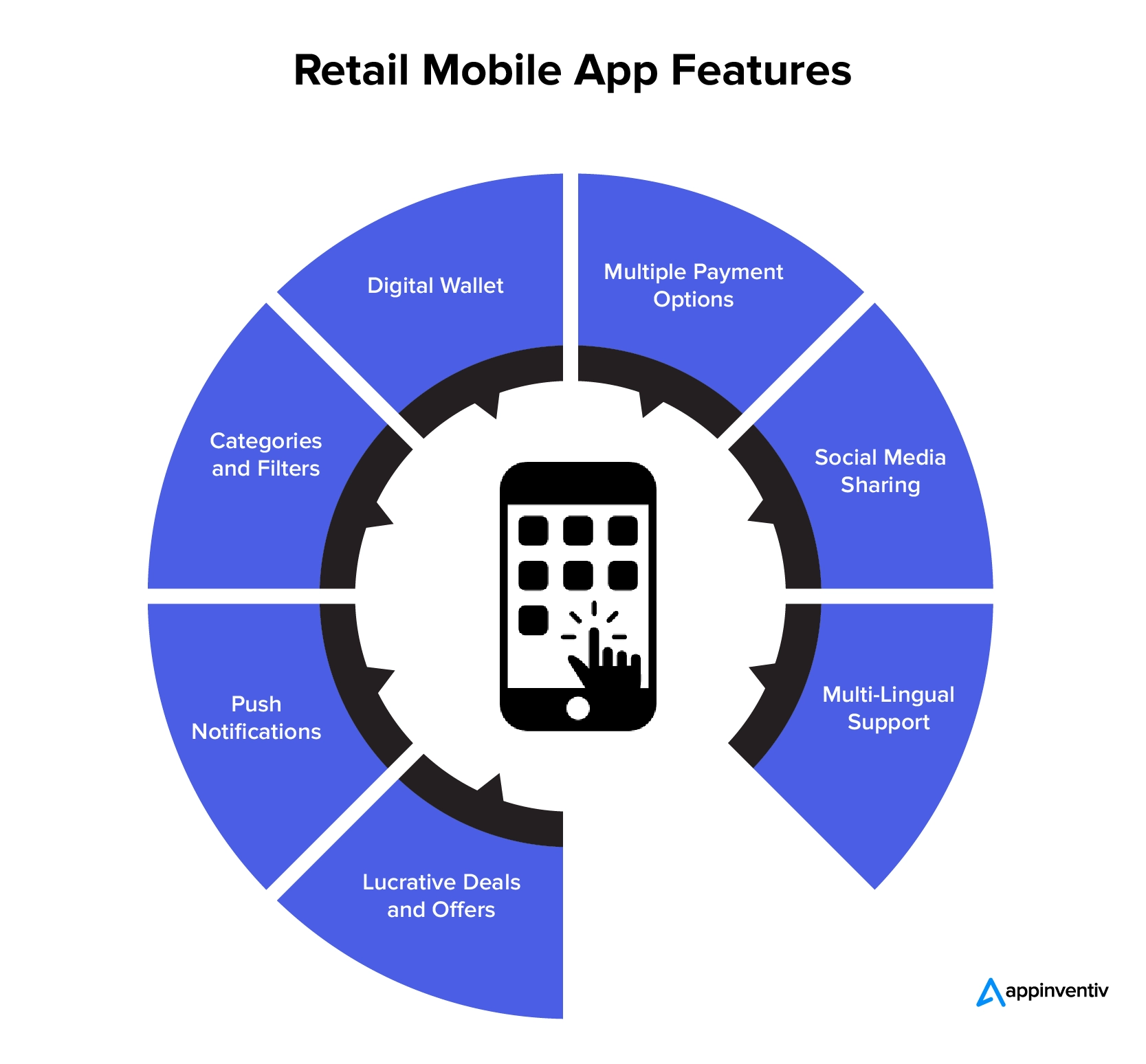
Lucrative Deals and Offers
It is one of the most vital features of retail mobile apps that help spread awareness about new launches. This feature can significantly retain old users and attract new customers, thereby increasing engagement and sales.
Push Notifications
You can use push notifications to inform customers of forthcoming deals, discounts, offers, and events. It informs the users about new product launches, the start of sales, business news, exclusive deals, and so on.
Categories and Filters
This is one of the most essential retail mobile app features, assisting users in filtering unnecessary products from the list of their search results and finding their desired products easily from a huge collection.
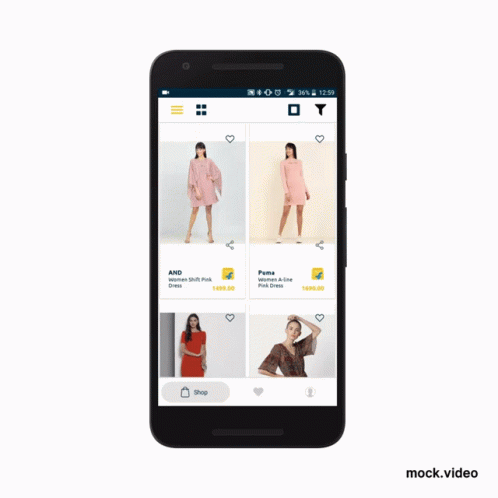
Digital Wallet
Mobile wallet integration is the most useful feature to provide an easy and secure shopping experience. A retail app development company incorporates digital wallet functionality into the app to facilitate swift and hassle-free payments, ensuring the safety of sensitive payment information and instilling trust in users.
Multiple Payment Options
Besides digital wallets, your mobile apps for businesses should support a variety of other payment options to cater to diverse user preferences. Payment through credit and debit cards, net banking, PayPal, and Cash-on-Delivery are some of the most popular payment options. As per a YouGov survey, 50% of online customers abandon their shopping carts if they don’t find their preferred payment method.
Social Media Sharing
This feature empowers app users to express their experiences, provide feedback, and post reviews about products or brands, opening up the power for social media promotion of your retail business.
Related Article: How to Create a Social Media App in 2023
Multi-Lingual Support
In this era of globalization, geographical boundaries are no longer a hindrance. Consequently, your mobile apps for retail business should incorporate multilingual support, catering to the needs of individuals from diverse linguistic backgrounds worldwide.
Geolocation, preview of product details, voice search, reviews & FAQs section, and price comparison are some additional features that make mobile apps for the retail industry more engaging.
Real-World Examples of Retail Mobile Apps
Still unsure how mobile apps for the retail industry can benefit businesses. Well, you don’t have to look far for evidence. Here are some real-world examples of retail mobile apps making a transformative impact on brands’ digital presence, sales, and reputation.
KFC
KFC, a well-regarded name in the food industry, expanded its digital presence and witnessed a huge surge in conversion rates by launching its application in 7+ global markets.
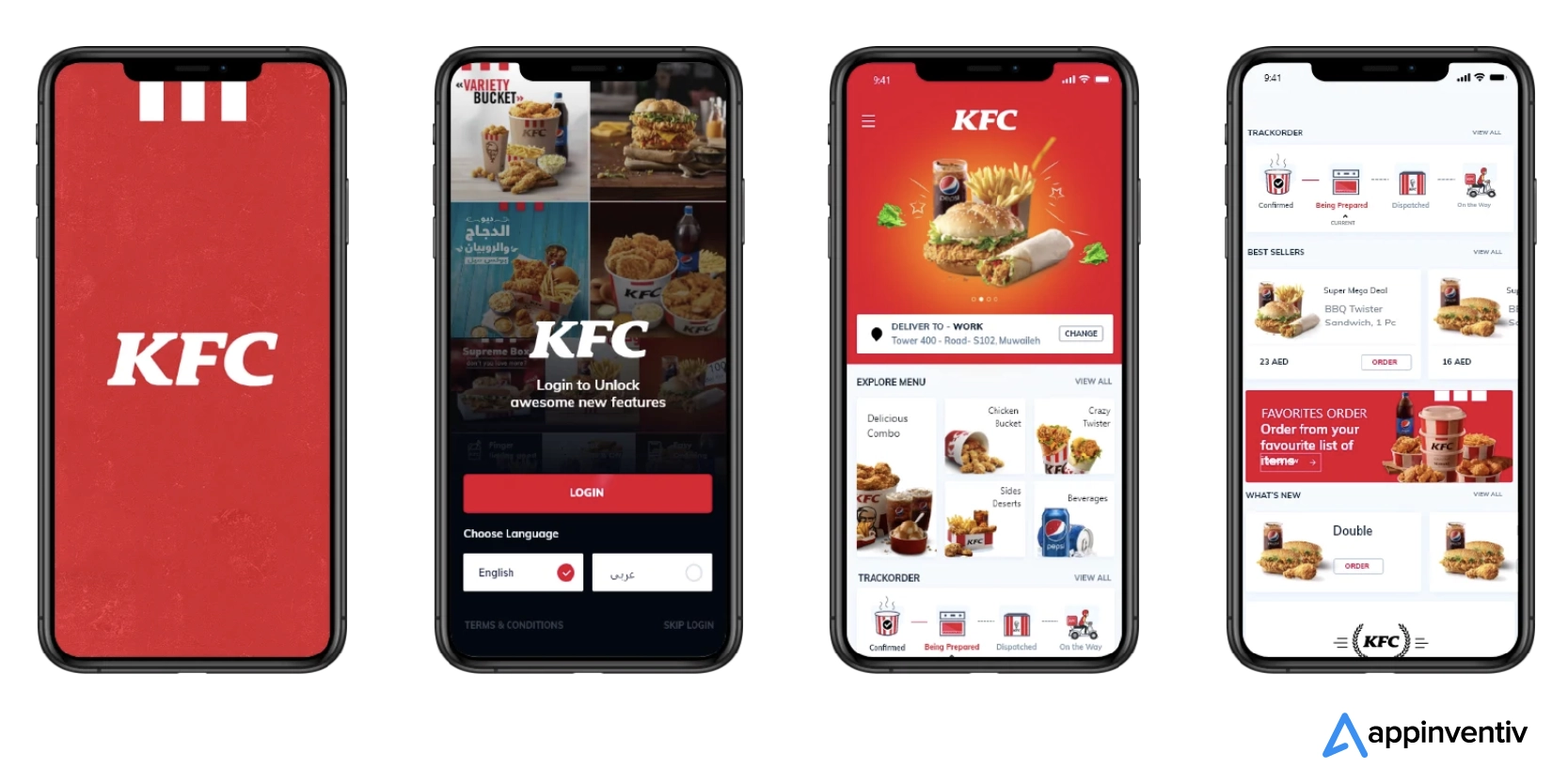
6th Street
6th Street, a leading online fashion platform, provides an excellent online shopping experience, allowing customers to buy a wide range of products promoted by their favorite influencers. This eCommerce giant showcases a range of exclusive shoes, bags, and accessories from many famous brands like New Balance, Dune London, Aldo, Skechers, Call it Spring, and many more.
Also Know: How Much Does It Cost to Develop an eCommerce App Like 6th Street?
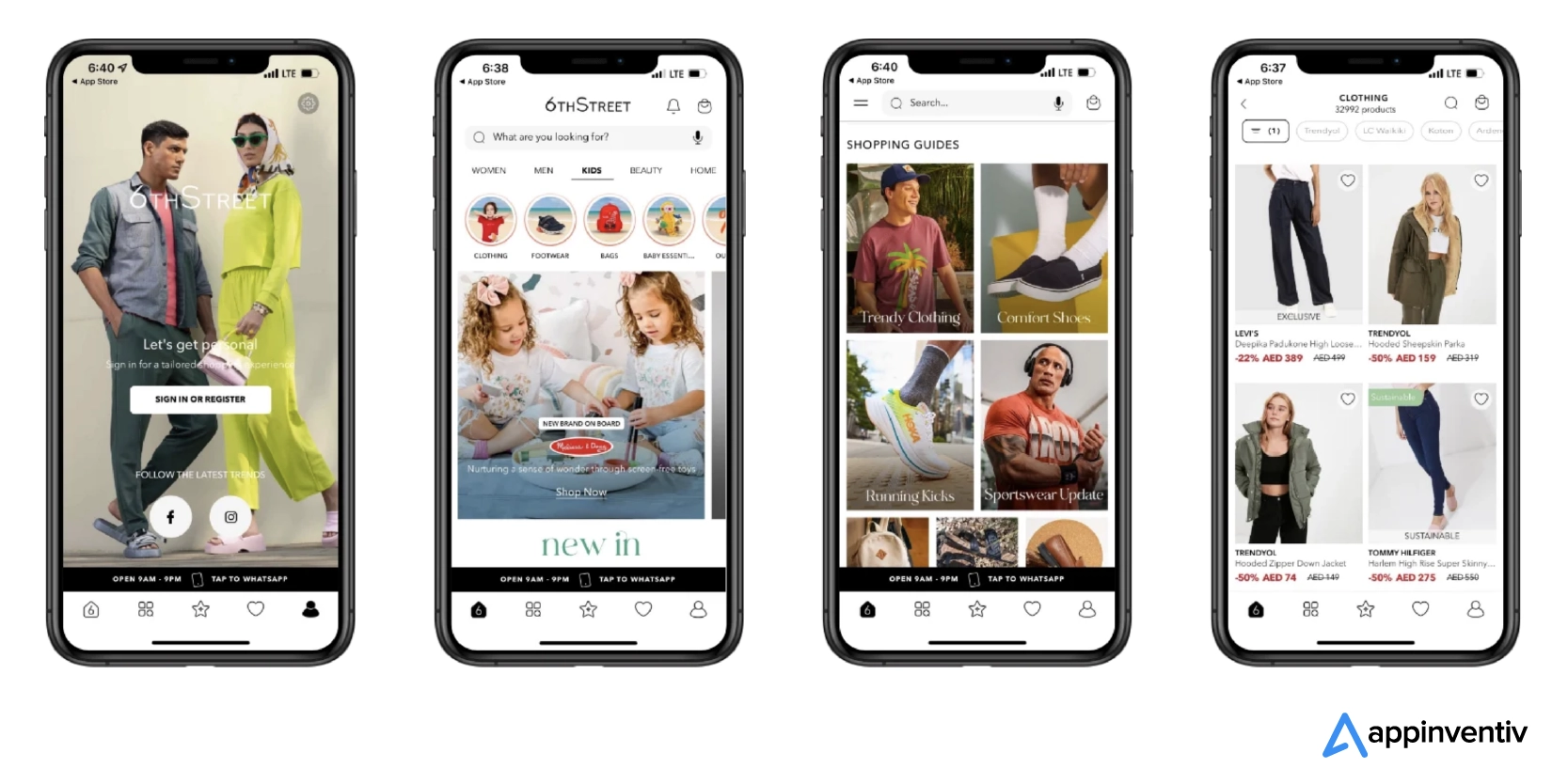
Adidas
Adidas, a leading sports merchandise brand, acquired 500K new users and established its digital presence globally by investing in artificial intelligence (AI) and machine learning (ML) powered mobile app development.
Also Know: How Much Does it Cost to Develop an App like Adidas?
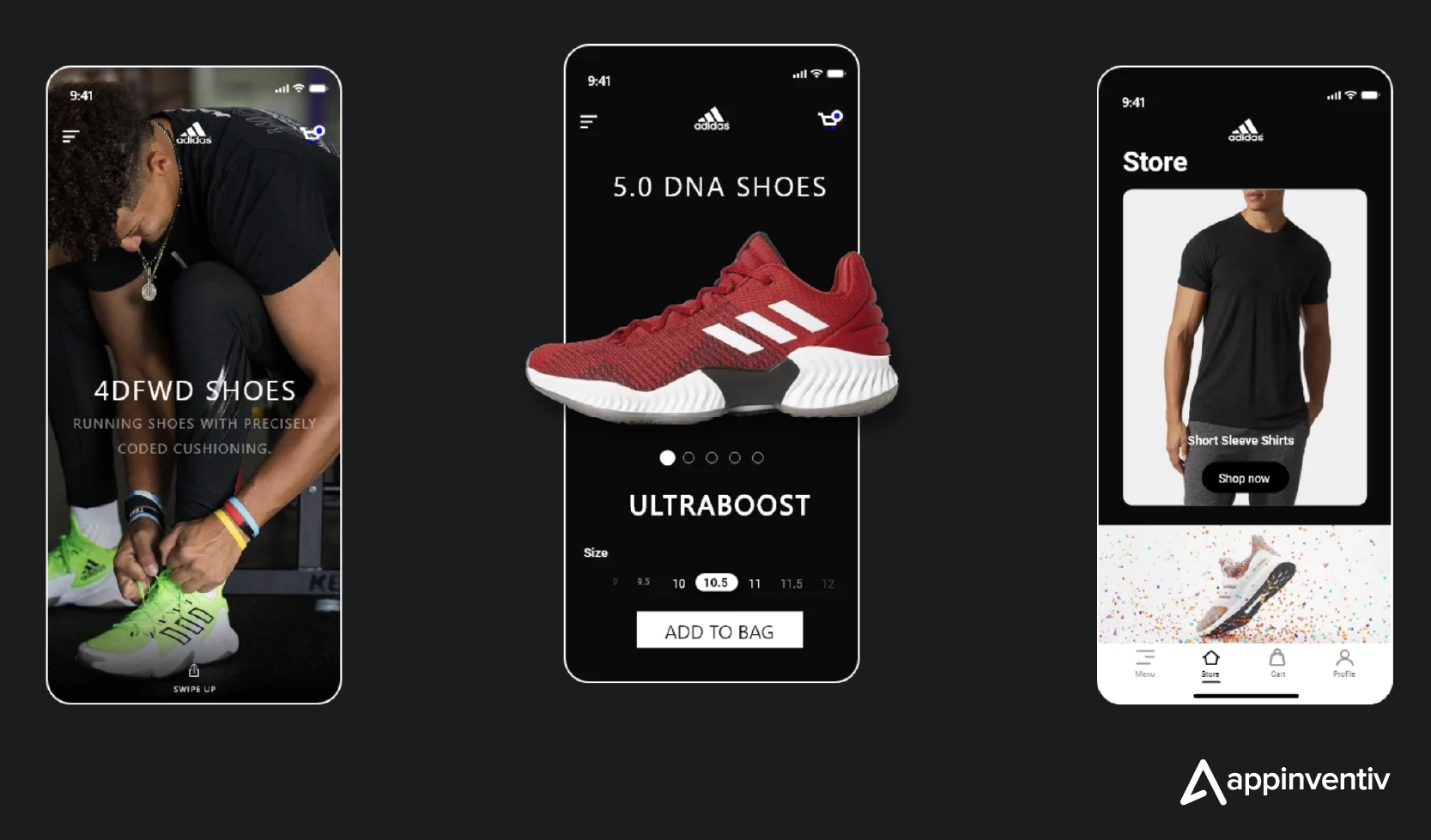
Appinventiv: Your Trusted Retail Mobile App Development Partner
Mobile apps for the retail industry provide businesses with a lucrative opportunity to cater to customer preferences for personalized shopping experiences and enhance operational efficiency. Thus, retailers who want to enhance business performance and improve customer experience must opt for eCommerce application development services to build one from scratch or revamp the existing one with user-centric features.
So, if you are looking for a custom retail mobile app development company specializing in building intuitive mobile apps for businesses, Appinventiv can be your trusted tech partner. Being a leading retail software development company, we have a proven track record of working with many world-class retail startups and established brands. Our portfolio is a testament to our experience in building best-in-breed mobile apps for retail businesses, helping brands redefine their marketing strategy and win customers’ loyalty.
Connect with us and get started with your mobile app development journey.
FAQs
Q. How much does custom retail app development cost?
A. The retail mobile app development cost varies widely depending on various factors, including developers’ hourly rates, the app’s complexity, choice of platform, list of features, etc. On average, retail mobile app development costs range between $30,000 to $300,000 or more. This price may considerably rise if features are added to make it more user-friendly.
Q. How long does it take to build an app for a retail business?
A. When you outsource retail app development, the first question that comes to your mind is the retail mobile app development time. However, there is no one-size-fits-all formula to answer it. The time required to build an app for a retail business varies significantly based on the app’s complexity and features.
For instance, a simple app with basic features can be built in 3-6 months, while more advanced and feature-rich mobile apps for retailers can take 6 months to a year or longer. It’s crucial to have a clear project plan and realistic timeline in place before starting with your mobile app development process.
Q. Why is a mobile app important for retail businesses?
A. A mobile app can be important for retail businesses as it provides them with numerous advantages, such as:
- Mobile apps for businesses can boost brand awareness.
- These apps gather customer data to analyze their purchasing behaviors and provide personalized shopping experience.
- Mobile apps for the retail industry help identify a company’s strong and weak points.
- Retail mobile apps help enhance user experience and streamline operational processes.
- Mobile apps for retailers have the potential to expand the customer base and increase engagement.


- In just 2 mins you will get a response
- Your idea is 100% protected by our Non Disclosure Agreement.
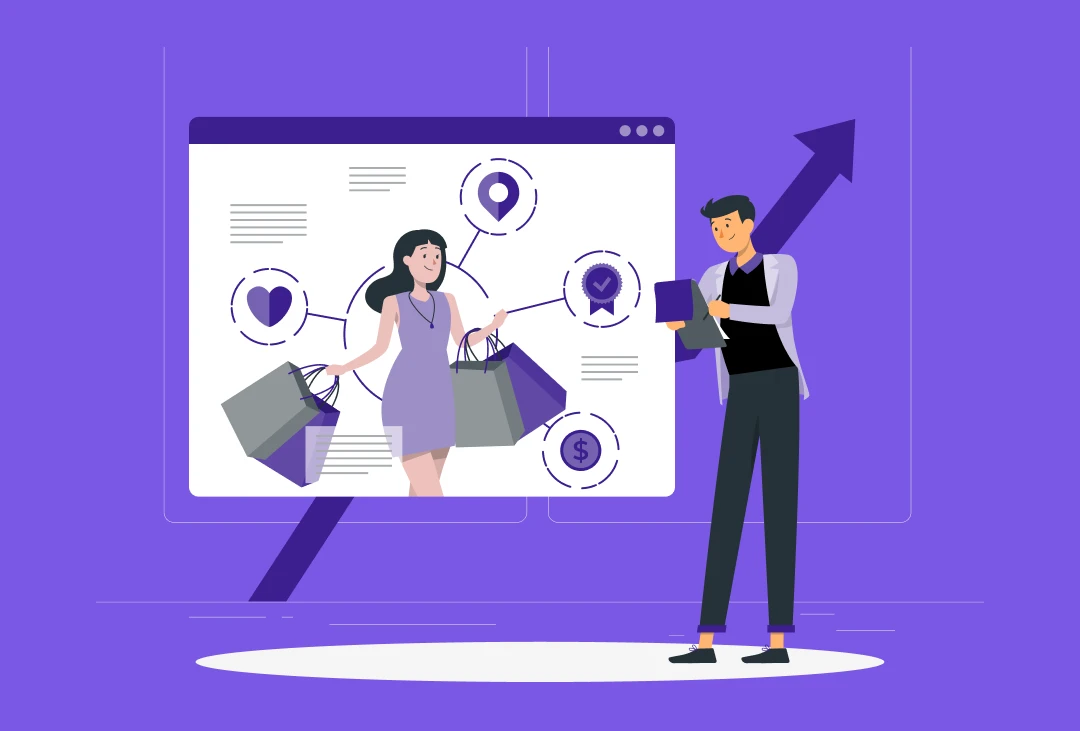
Key takeaways: Outdated systems cause inefficiencies, poor customer experiences, and missed opportunities. Appinventiv helped a US retailer achieve a 25% sales increase and 15% growth in AOV post-transition. Real-time data enhances customer experiences and reduces the cart abandonment rate The new platform handled 3x traffic during peak periods, supporting future growth. Ever noticed how fast…
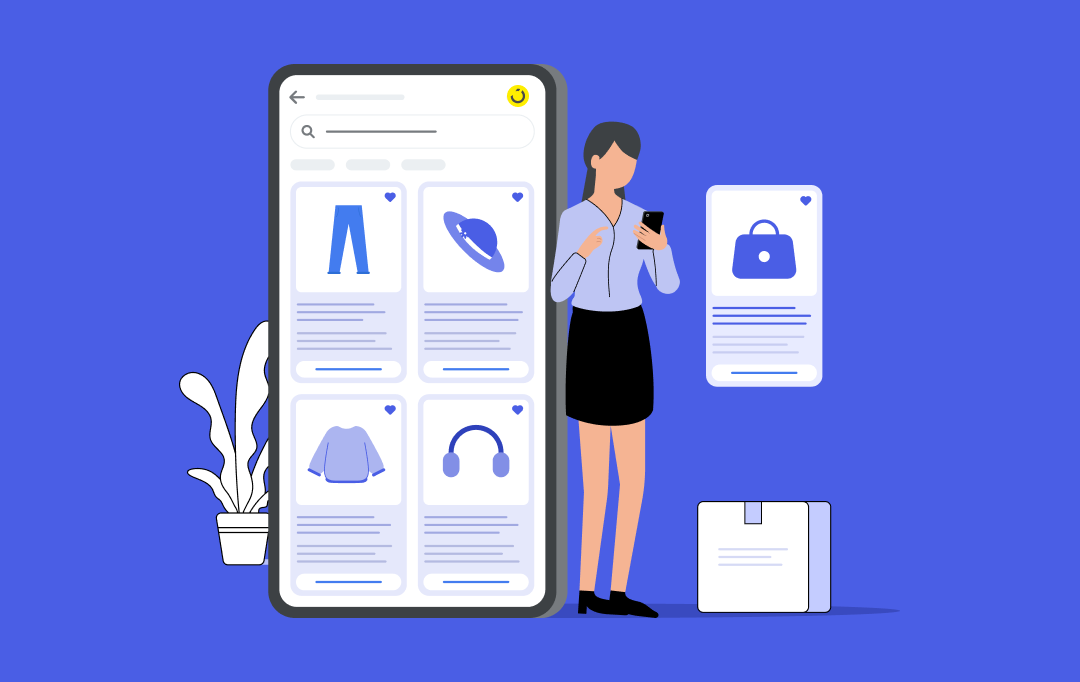
How Much Does It Cost to Build an E-commerce App Like Noon?
Key takeaways: Noon’s success highlights the rising demand for mobile-first eCommerce in the UAE. Building a similar app can cost anywhere between $ 30,000 and $200,000+, depending on the scope. The blog covers all key user and admin features needed to build a Noon-like app. Identify key cost drivers, including feature complexity, scalability, platform, and…

How to Build a Quick Commerce App? Features, Process, Costs
Key Takeaways Quick commerce is a rapidly growing market driven by consumer demand for ultra-fast delivery and seamless convenience, projected to reach 900 million users by 2029. Quick commerce app development costs vary widely based on features and scale, ranging from $40,000 for an MVP to $400,000+ for a fully featured app. Core features, such…






